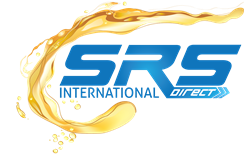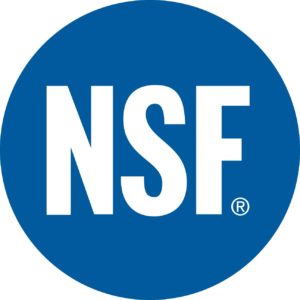NSF International, formerly known as the National Sanitation Foundation, is an independent non-profit organization that provides standards development, product certification, auditing, education, and risk management for public health and safety. Additionally, here are some details related to NSF certifications:
Purpose of NSF Certification
The main aim of NSF certification is to protect food, water, consumer products, and the environment. Additionally, the NSF mark on a product means that the product (Tri-Clamp, Sanitary Actuators, Ball Valves, Pressure, Level, Temperature) complies with all standard requirements.
NSF/ANSI Standards
NSF has developed over 80 public health and safety American National Standards (ANSI). For example, NSF/ANSI 61 is for drinking water system components, and NSF/ANSI 42 is for residential drinking water filtration devices.
Certification Process
The process typically involves product testing, materials analysis, facility inspections/audits, and market surveillance. Also, this process is designed to confirm that a product meets the specifications of applicable standards.
Product Categories
NSF provides certification for a wide range of products like food equipment, dietary supplements, drinking water treatment and distribution systems, pool and spa equipment, plastics, and pesticides.
Global Recognition
NSF International is widely recognized for its credibility and authority in certification. It’s accepted by authorities around the globe.
Continued Compliance
Once a product is certified, NSF performs periodic facility audits and product testing to ensure the product continues to comply with the standard.
Transparency
NSF includes all products that meet its standards in an online listing database that anyone can access. Remember, not all products require NSF certification. In addition, it’s typically used in industries where product quality and safety are a major concern, such as food, water, and health sciences.
If you manufacture, distribute, or use valves for potable water or food processing. You will most likely have come across the acronym NSF which confirms and certifies. Also, you should not use a valve that lacks NSF certification ratings for distribution. In addition, potable water or in food processing.
Passing NSF Certifications?
Above all, use a valve that isn’t certified when you have an application that calls for an NSF certification. Also, this is not a good approach will not pass state and federal inspections and is simply against the law.
What are NSF Certifications?
NSF stands for the National Sanitation Foundation. When a valve, fitting, or pipe is NSF-certified, it meets or exceeds specific standards. Finally, state and federal laws enforce these standards. Not all NSF standards pertain to food or water.
NSF Certification Standards?
There are numerous standards for a variety of media. Also, many relate to commercial and residential plumbing. Others are for pharmaceutical safety, etc. Moreover, the point is if the valve you want to purchase and use in your application does not carry NSF certifications. Furthermore, if the application requires one, you should contact a valve expert before installation.
Safety and Protection
It’s all about safety and protecting yourself from possible liability and lawsuits. Also, an inspection that fails to identify NSF-certified valves in place, where they should be could be very costly. In addition, this can be very devastating to a business or municipality depending on how many valves. You will need to immediately replace the other line components, and this will depend on them.
Identifying NSF Certification
Most manufacturers will display the NSF seal of approval on their submittal sheets or specification sheets to inform you upfront whether they have certified a valve as NSF-approved. Furthermore, some will list valves as being certified. Also, others will let you know which valves are not certified.
In conclusion, if the manufacturer data sheet doesn’t mention NSF certifications, you should contact the manufacturer directly.
NSF Certification
Also, since many different factors can lead to a product’s NSF certification, the acronym NSF may be followed by a series of numbers that specify the product’s specific media certification.
For instance, a marking of NSF-61 or NSF/ANSI 61 indicates that the valve or other related product has received approval for a potable water application.
NSF Certifications Chart
| NSF/ANSI 14, ASTM, UL | Relevant Standards, Protocols & Systems |
| Automotive | |
| Automotive Collision Repair Shop Certification Program | NSF P458 |
| Automotive Parts Certification Program | NSF P367, P368, P369, P370, P371, P377, P379 |
| Automotive Parts Distributor Certification Program | NSF P394 |
| Friction Material Program | SAE J2975 |
| Building Products and Interiors | |
| Electrical Safety | ANSI/UL 48, 197, 651, 763, CSA C22.2 No. 109, 211.2, NEMA TC2, UL 1795 |
| Fire Safety Products | NSF/ANSI 14, ASTM, UL |
| Gas Distribution Products | NSF/ANSI 14, ASTM D2513, CSA B137.4 |
| Consumer and Retail Products | |
| Cosmetics Good Manufacturing Practices (GMP) | |
| Home Product Certification | NSF P386, P387, P388, P389, P390, P400, P402, P403, P405, P406, P407, P408, P412 |
| Kitchen Products | NSF/ANSI 184, NSF P152, P156, P180, P203, P205, P224, P235 |
| Water Filters | NSF/ANSI 42, 44, 53, 55, 58, 62, 177, NSF P231, P473, P477, NSF/JWPA P72, CSA B483.1, INMETRO ABNT/NBR 14908 |
| Dietary Supplements | |
| Athletic Banned Substances Program | NSF Certification Guideline 306 |
| Dietary Supplements | NSF/ANSI 173 |
| Functional Food and Beverages | NSF Certification Guideline 229 |
| Good Manufacturing Practices (GMPs) | |
| Food Safety and Quality | |
| Bottled Waters and Beverages | |
| Commercial Food Equipment | NSF/ANSI 2, 3, 4, 5, 6, 7, 8, 12, 13, 18, 20, 21, 25, 29, 35, 36, 37, 51, 52, 59, 169, NSF P149, P155 |
| Consumer Values Verified Certifications | Gluten-Free, Non-GMO True North |
| HACCP Compliance Verification | |
| Hygienically Clean Napery | NSF P413 |
| ISO 21469 Certified Lubricants | |
| Meat and Poultry Processing Equipment | NSF/ANSI/3-A 14159-1, 14159-3 |
| Nonfood Compounds – White Book™ | |
| Organic and Specialty Certifications | QAI Organic Foods, NSF/ANSI 305 Organic Personal Care Products |
| Processed Foods and Beverages | NSF Certification Guideline 227 |
| Laboratory Equipment and Related Services | |
| Biosafety Cabinetry | NSF/ANSI 49 |
| Class II Biosafety Cabinet Field Certifiers | |
| Management Systems | |
| Management Systems Registration | Sustainable Product Certification, Sustainable Service Certification, Landfill-Free, and Other Claims Verifications |
| Sustainability and Environment | |
| Sustainability and Environmental Programs | Sustainable Product Certification, Sustainable Service Certification, Landfill-Free and Other Claims Verifications |
| Water and Wastewater | |
| Bottled Waters and Beverages | |
| Drinking Water System Components | NSF/ANSI 61 |
| Drinking Water Treatment Chemicals | NSF/ANSI 60 |
| Drinking Water Treatment Units | NSF/ANSI 42, 44, 53, 55, 58, 62, 177, 401, NSF P231, P473, P477, NSF/JWPA P72, CSA B483.1, INMETRO ABNT/NBR 16098 |
| Fabricated Ductile Iron Pipe | AWWA C115, C606 |
| Lead Content Certification | NSF/ANSI 372 |
| Onsite Wastewater Inspectors | |
| OQC Registration | Origine e Qualità Controllata |
| Plumbing System Components | NSF/ANSI 14, 24, 358, NSF P374, ASTM, ASME, CSA, IAPMO, ASSE, AWWA |
| Public Drinking Water Equipment Performance | NSF/ANSI 419 |
| Recreational Water Facility Products | NSF/ANSI 50, APSP, ASME, ASTM, IAPMO |
| Wastewater Treatment Units | NSF/ANSI 40, 41, 46, 245, 350, P157, CAN/BNQ 3680-600, ISO 11143 |
| Other | |
| Authorized Protocol Certifications | P149, P151, P154, P155, P157, P172, P182, P231,P308, P335, P351, P352, P353, P413, P442, P447, P467 |
| Laboratory Accreditation |

